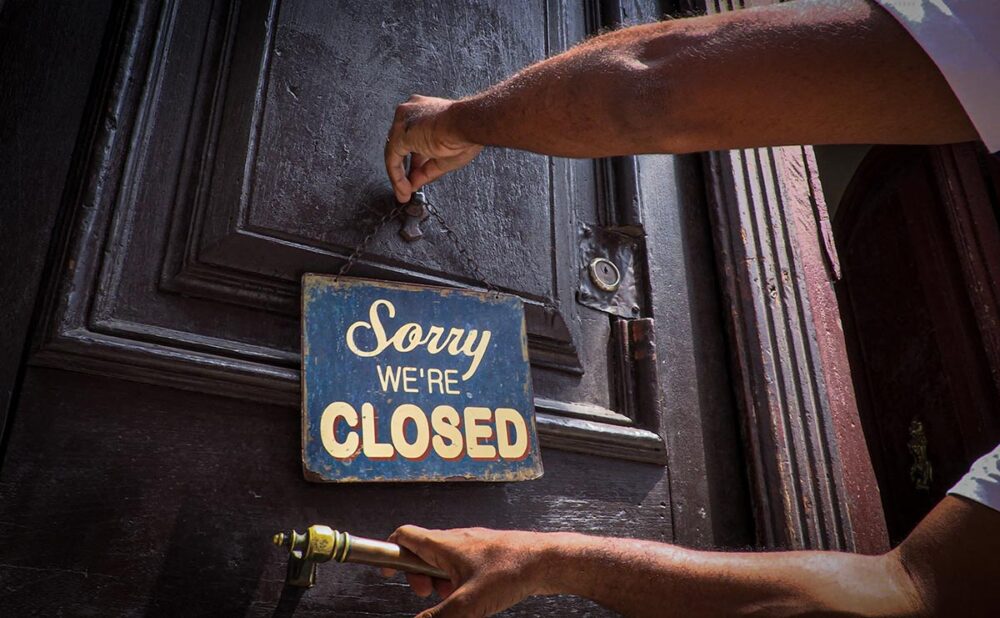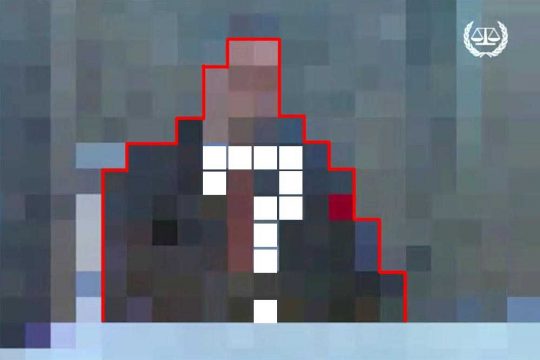I don’t often expect to be apologised to by an international criminal court judge. But on 23 October 2023 it happened twice in less than two hours. British judge Joanna Korner, sitting in the centre of the judges’ raised podium in Courtroom II, was visibly exasperated when she looked up to the public gallery and told us at about 9:35am – 5 minutes into the hearing – to go for a coffee break for an hour as the chamber was turning to private session. By 11:15am, when those of us determined to witness some of the trial had returned and sat patiently for 30 minutes, listening to the deafening silence coming through our headsets, she told us to abandon hope and leave the International Criminal Court (ICC) for the day.
Korner’s frustration stemmed, in part, from the fact that 23 October 2023 was the beginning of the Defence’s presentation of evidence in the trial of Ali Muhammad Ali Abd-Al-Rahman, also referred to as ‘Ali Kushayb’ by the prosecution. Al-Rahman is alleged to have been a Janjaweed militia leader in Darfur, Sudan, and stands accused of 31 counts of war crimes and crimes against humanity committed in 2003 and 2004. The previous week, when his defence lawyer Cyril Laucci launched into opening statements, he had insisted on the importance of the public nature of the trial. Now he was requesting that a key witness give almost his entire testimony in private session.
Silence vs Justice
Traipsing out of the public gallery, I had cause to reflect on what has become something of an epidemic of silence within contemporary international criminal trials. Trials being concealed from the public is by no means the intent of the international criminal justice project. In the Rome Statute – the cornerstone document of the International Criminal Court (ICC) – the word ‘justice’ appears 14 times. The phrase “interests of justice” appears 6 times. One of the oft-repeated ‘interests of justice’ is that “justice must be seen to be done”.
Private and closed session are two tools to help protect vulnerable witnesses and maintain the prosecutor’s ability to investigate and build cases in situations of ongoing conflict and instability. Their overuse, however, risks undermining the accessibility, transparency, symbolic, and reconciliatory potential of international criminal justice. Private and closed sessions prevent any audience – observers, academics, politicians, press, the general public, victims, and survivors – from ‘seeing’ justice being done. Without transparency during trial, judgements risk being rejected by key stakeholders to the court. If an audience cannot see the evidence which leads to the judgement, nor the interactions of and debates between court actors regarding that evidence, why should a dense final document, often running into hundreds of pages, change anybody’s mind about a conflict situation, or the guilt or innocence of an alleged perpetrator?
Concealed Session by Numbers
There is, technically, a difference between private and closed session. Closed session means that the public gallery is closed, and observers are asked to leave. Private session means that the gallery remains open, but no sound emerges from the courtroom. In reality, the trial-observer experiences much the same thing. This is especially true in the digital age of trial observation. If an observer is following court proceedings online, both closed and private session result in a blocked screen, informing the viewer that there is no transmission. Lawyers requesting private or closed session often get the terms mixed up, or use them interchangeably.
The phenomenon of closed and private session has reached, in modern international criminal trials, epidemic proportions. The trial of Jean-Pierre Bemba at the ICC opened on 22 November 2010 and ran for almost 4 years, with closing statements finally being completed on 13 November 2014. The trial chamber sat for 305 days of trial hearings. In total, these trial hearings included approximately 26.648 minutes of private and closed session. That is an average of almost 90 minutes every day when the public, press, victims, survivors, and other interested parties could not monitor the trial.
The Bemba trial is not an outlier. A random sampling of days from a 9 month period during the 2016-19 trial of Laurent Gbagbo and Charles Blé Goudé shows an average of 100 minutes per day of private session. A random sample of 5 trial days across 5 months in the 2022-23 trial of Félicien Kabuga at the International Criminal Tribunal for Rwanda’s residual Mechanism in the Hague shows an average of 28 minutes of private or closed session per day: significantly less, but an immense amount considering each trial ‘day’ lasted only 2 hours.
Technically speaking, a majority of an average trial day is likely to be in public session – aligning with the mantra that private and closed session is the exception and not the rule. But considering the complexity, profile, and length of atrocity crime proceedings before international courts, these numbers are still staggering. So much of any given day of the trial being obscured from observers prevents press coverage which would explain, analyse, and amplify court proceedings to a wider audience. It prevents victims, survivors, and their wider communities from hearing their own stories being discussed in court, and from hearing stories about those allegedly responsible for the violence they have endured. It also prevents those sceptical of, or opposed to a court from properly engaging with the stories that emerge from any of its judgements. The prevalence of concealed sessions, and the frequency with which court actors – judges, lawyers, and witnesses – mention the need to be careful about what is said in open session creates a sense, rightly or wrongly, that what is said in public is somehow restricted, incomplete, or partial.
Even witnesses within a courtroom sometimes share this sentiment. Witness P-38 in the Bemba trial announced that “it is a bit unpleasant for the public, but to really get to the crux of the trial, I believe it is necessary” to go into private session. Another witness, in a now-unredacted transcript, expressed when in private session that “the time is right to tell you outright”. Even those participating in the trial, therefore, perceive some kind of authenticity to private session which must be policed when “the public” are listening. Irritation at attending a trial but instead listening to silence is one thing. The idea that the ‘real’ trial is that which goes on behind closed doors is quite another, and undermines the raison d’être of international criminal justice proceedings.
‘Appearing in public is part of the witness responsibility’
Who wants private session, when, and why? The answer seems to be everybody and nobody. Judge Cuno Tarfusser, about 8 months into the Gbagbo trial, felt the need to reiterate that in the absence of a concretely identifiable risk to witness-safety, “appearing in public is part of the responsibility attached to the role” of a witness. The problem is that private and closed session has become a quagmire of tangled responsibilities and fears. Although court actors seem regularly frustrated with the practice, there is no apparent way of preventing a trial getting sucked into the quicksand of concealed sessions. In the Bemba trial, judges were alternatively irritated at repeated private sessions – “there was no need at all for private session”, and insistent that private session was necessary – “Mr. Witness, I suggest you continue your testimony in private session”. Witnesses are sometimes obsessively concerned with the privacy of their testimony – “I prefer closed session”, and other times adamant about the need for an audience – “This is historical testimony that will affect generations. I don’t think it needs to be hidden”. Defence counsel often laud the merits of a public trial, but can also be quick to request private session, as in the case of Laucci’s request during the Al-Rahman trial. In general, it is prosecution counsel who are most consistently in favour of private and closed session. One witness in the Gbagbo trial argued with prosecution counsel Eric MacDonald while on the stand, as MacDonald asked the judges to overrule the witness’s request to testify in open session.
Concerns over witness safety are understandable, and important. But the prevalence of private and closed session in contemporary criminal trials is a trend, not a long-standing practice. At the International Criminal Tribunal for Rwanda (ICTR), there were many ‘protected’ witnesses whose identities were kept private, but whose testimony was accessible to observers.
Face-saving exercice for the OTP
Reading years of transcripts and the debates they contain over private session, the current trend seems to me to be indicative of two things. First, contemporary criminal trials tend to investigate and try atrocity situations which are ongoing, or where violence or instability is still prevalent. As such witnesses are more often testifying from within contexts that are inherently less-stable. This does not explain, however, the prevalence of private session in the trial of someone like Félicien Kabuga, who at age 90 was on trial for acts committed in 1994. The second, and perhaps more insidious reason for an increase in private session is the potentially devastating impact on the Office of the Prosecutor (OTP), should anything happen to any witness or individual mentioned in a criminal trial. Both the Bemba and Gbagbo prosecution teams faced criticism for their investigation strategies – relying largely on NGO reports and access granted by the incumbent government which in both instances had political skin in the justice game. If it was understood that testifying in the Hague for the ICC office of the prosecutor was unsafe, the quality of investigations would only deteriorate further, something the OTP potentially cannot afford. Private session, in this instance, is a face-saving exercise for the OTP.
What, then, is the solution? Witness safety will not (and should not) be deprioritised in international criminal trials. But current levels of obsession with witness safety are symptomatic of a deeper problem. More robust OTP investigations, greater clarity and guidelines about private session, and less complacency from all trial actors about allowing concealed sessions to continue unchecked would undoubtedly go some way towards easing the problem. But the existential roots of the issue also require open and frank discussion and debate. At the moment, these seems unlikely, as even within a trial debates over the merits or challenges of private session are often discussed in – you guessed it – private session. As things stand, all the lip-service paid toward the importance of public trials does not reflect a reality that is undermining the visibility, accessibility, and legitimacy of contemporary trials.







